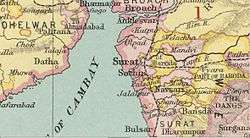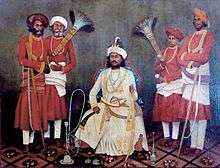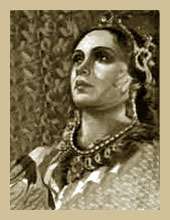Sachin State
| Sachin State સચીન રિયાસત سچن ریاست | |||||
| Princely State of British India | |||||
| |||||
|
Flag | |||||
 | |||||
| History | |||||
| • | Established | 1791 | |||
| • | Independence of India | 1948 | |||
| Area | |||||
| • | 1931 | 127 km2 (49 sq mi) | |||
| Population | |||||
| • | 1931 | 22,107 | |||
| Density | 174.1 /km2 (450.8 /sq mi) | ||||
| Today part of | Surat district, Gujarat State | ||||
| | |||||



The Sachin State (Gujarati: સચીન રિયાસત; Urdu: سچن ریاست) was a princely state belonging to the Surat Agency, former Khandesh Agency, of the Bombay Presidency during the era of the British Raj. Its capital was in Sachin, the southernmost town of present-day Surat district of Gujarat State.
History
Sachin state was founded on 6 June 1791. Although over 85% of the subjects were Hindu, the state was ruled by Sunni Muslim Sufis of the Sidi dynasty of Danfa-Rajpuri and Janjira State. The Sidi dynasty is of African origin.[1]
Sachin State was under the protection of the Maratha Peshwa until it became a British protectorate. The state became bankrupt in 1829 and during the period between 1835 and 1864 the state was under British civil administration. It had its own cavalry, currency, and stamped paper, as well as a state band that included Africans.
Fatima Begum (1892 - 1983), one of the early superstars in Indian cinema and India's first female film director, was allegedly married to Nawab Sidi Ibrahim Muhammad Yakut Khan III of Sachin State. But Sachin royal family sources cast a veil over this[2] claiming no record of a marriage or contract having taken place between the Nawab and Fatima Bai or of the Nawab having officially recognised their children, Sultana, Zubeida and Shehzadi, as his own.[3] Sultana, the daughter of Fatima Begum,[4] became a leading figure in early Indian movies.[5] Zubeida, leading actress of India's first talkie film Alam Ara (1931), was her younger sister.[6]
Nawab Sidi Ibrahim Muhammad Yakut Khan III, Sachin State's last ruler, signed the accession to join the Indian Union on 8 March 1948. The state then became part of Surat district in Bombay Province.[7][8]
After the Partition Zubaida stayed in India, while her sister Sultana moved to Pakistan where she married and had a daughter, Jamila Razzaq, who became a prominent Pakistani actress in the decade between the mid 1950s and the mid 1960s.[9]
Rulers
The rulers of Sachin State bore the title 'Nawab' and were granted the right of a 9 gun salute by the British authorities.[10]
Nawabs
- 6 Jun 1791 - 9 Jul 1802 Abdul Karim Mohammad Yakut Khan I (b. 17.. - d. 1802)
- 9 Jul 1802 - 25 Mar 1853 Ibrahim Mohammad Yakut Khan I (d. 1853)
- 25 Mar 1853 – 1 Dec 1868 Abdul Karim Mohammad Yakut Khan II (b. 1802 - d. 1868)
- 1 Dec 1868 – 4 Mar 1873 Ibrahim Mohammad Yakut Khan II (b. 1833 - d. 1873)
- 4 Mar 1873 - 7 Jan 1887 Abdul Kadir Khan (b. 1865 - d. 1896)
- 4 Mar 1873 - Jul 1886 .... -Regent
- 7 Feb 1887 - 19 Nov 1930 Ibrahim Mohammad Yakut Khan III (b. 1886 - d. 1930)
- 7 Feb 1887 - 4 May 1907 .... -Regent
- 19 Nov 1930 - 15 Aug 1947 Haydar Mohammad Yakut Khan (b. 1909 - d. 1970)
See also
References
- ↑ Pandey, Vikash (19 December 2014). "Africans in India: From slaves to reformers and rulers". Newspaper. Retrieved 19 December 2014.
- ↑ RoyalArk - Princely State of Sachin 3
- ↑ Sachin Princely State (9 gun salute)
- ↑ "Sultana-actress". amazon.com/IMDb.com. Retrieved 13 September 2012.
|first1=missing|last1=in Authors list (help) - ↑ Indian films and posters from 1930
- ↑ "sultana". Cineplot.com. Retrieved 13 September 2012.
- ↑ Hunter, Sir William Wilson. The Imperial Gazetteer of India. London, Trübner & Co., 1885
- ↑ Malleson, G. B. An historical sketch of the native states of India, London 1875, Reprint Delhi 1984
- ↑ Jamila Razzaq and Zubaida
- ↑ Princely States of India
External links
 Media related to Sachin State at Wikimedia Commons
Media related to Sachin State at Wikimedia Commons- Early Indian Movies
Coordinates: 21°05′N 72°53′E / 21.08°N 72.88°E
